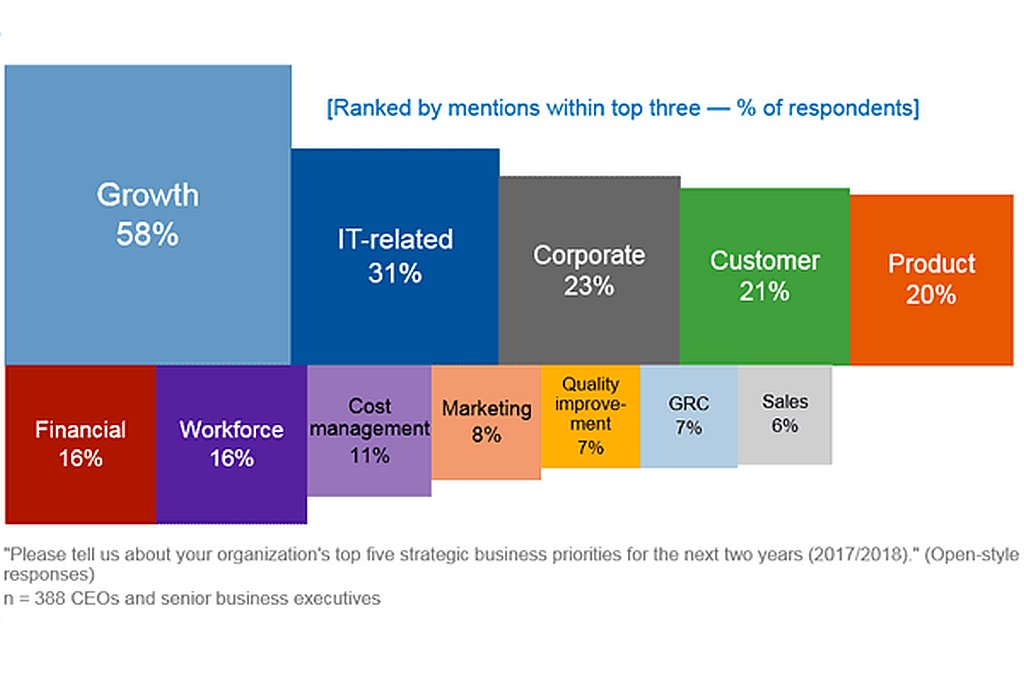IT-bezogene Änderungen nehmen Platz 2 bei den Geschäftsprioritäten ein; höchstes Ranking seit Beginn der Umfrage.
Die unsichere Lage der Weltpolitik hat die Profit- und Wachstumsziele der CEOs für 2017 nicht verändert. Wachstum ist nach wie vor für rund 58 Prozent der CEOs die höchste Priorität des Unternehmens, so eine aktuelle Umfrage des IT-Research- und Beratungsunternehmens Gartner [1]. Bei der Umfrage wurden insgesamt 388 CEOs befragt. Im Vorjahr nannten hingegen nur 42 Prozent der CEOs Wachstum als wichtigstes Ziel.
Abbildung 1: CEO Top Business Priorities for 2017 and 2018
Source: Gartner (April 2017)
Produktverbesserung und Technologie sind die Prioritäten der CEOS, die 2017 prozentual am meisten anstiegen (siehe Abbildung 1). »Prioritäten, die im Zusammenhang mit IT stehen, wurden von 31 Prozent der CEOs genannt und erreichten damit in der CEO-Umfrage einen Stellenwert, der noch nie zuvor höher war, » erklärt Mark Raskino, Vice President und Gartner Fellow. »Fast doppelt so viele CEOs planen, die firmeninternen Technologien und digitalen Ressourcen auszubauen (57 Prozent) statt outzusourcen (29 Prozent). Wir nennen diesen Trend die Reinternalisierung der IT – dabei werden die Informationstechnologie und die damit verbundenen Fähigkeiten aus Wettbewerbsgründen wieder zurück in das Unternehmen geholt. Dies ist der Beginn einer neuen Ära von Technologiemöglichkeiten und Potenzial.«
Gartner Survey Shows 42 Per Cent of CEOs Have Begun Digital Business Transformation
IT-Related Changes Are No. 2 Business Priority; Highest Ranking Since Launch of CEO Survey
An unsettled global political environment has not shifted CEOs‘ focus on profits and growth in 2017. Growth is the No. 1 business priority for 58 per cent of CEOs, according to a recent survey* of 388 CEOs by Gartner, Inc. This is up from 42 per cent in 2016.
Product improvement and technology are the biggest-rising priorities for CEOs in 2017 (see Figure 1). »IT-related priorities, cited by 31 per cent of CEOs, have never been this high in the history of the CEO survey,« said Mark Raskino, vice president and Gartner Fellow. »Almost twice as many CEOs are intent on building up in-house technology and digital capabilities as those plan on outsourcing it (57 per cent and 29 per cent, respectively). We refer to this trend as the reinternalisation of IT — bringing information technology capability back toward the core of the enterprise because of its renewed importance to competitive advantage. This is the building up of new-era technology skills and capabilities.«
CEO Understanding of Digital Business Is Improving
While the idea of shifting toward digital business was speculative for most CEOs a few years ago, it has become a reality for many in 2017.
Forty-seven per cent of CEOs are being challenged by the board of directors to make progress in digital business, and 56 per cent said that their digital improvements have already improved profits. »CEO understanding of the benefits of a digital business strategy is improving,« said Mr Raskino. »They are able to describe it more specifically. Although a significant number of CEOs still mention e-commerce or digital marketing, more of them align it to advanced business ideas, such as digital product and service innovation, the Internet of Things, or digital platforms and ecosystems.«
CEOs have also progressed in their digital business endeavours. Twenty per cent of CEOs are now taking a »digital-first« approach to business change. »This might mean, for example, creating the first version of a new business process or in the form of a mobile app,« said Mr Raskino. »Twenty-two per cent are taking digital to the core of their enterprise models. That’s where the product, service and business model are being changed and the new digital capabilities that support those are becoming core competencies.«
Half of CEOs Have No Digital Success Metric
Although more CEOs have digital ambitions, the survey revealed that nearly half of CEOs have no digital transformation success metric. »For those who are quantifying progress, revenue is a top metric: Thirty-three per cent of CEOs define and measure their digital revenue,« said Mr Raskino.
CIOs to Help CEOs Set Success Criteria for Digital Business
Deeper transformation can only be achieved at scale if it is systematically driven. »CIOs should help CEOs set the success criteria for digital business,« added Mr Raskino. »It starts by remembering that you cannot scale what you do not quantify, and you cannot quantify what you do not define. You should also ask yourself: What is ‚digital‘ for us? What kind of growth do we seek? What’s the No. 1 metric and which KPIs must change?«
Many CEOs have recognised that being open-minded, entrepreneurial, adaptable and collaborative are the most-needed digital leadership mindsets. »It is time for CEOs to scale up their digital business ambition and let CIOs help them set and track incisive success metrics and KPIs, to better direct business transformation. CIOs should also help them toward more-abstract thinking about the nature of digital business change and how to lead it,« concluded Mr Raskino. »The disruption it brings often cannot be dealt with wholly within existing frames of reference.«
More-detailed analysis is available for Gartner clients in the report, »2017 CEO Survey: CIOs Must Scale Up Digital Business.« https://www.gartner.com/technology/home.jsp
[1] Gartner conducted a survey of 388 CEOs and senior business leaders in user organizations worldwide in the fourth quarter of 2016 to examine their business issues and some areas of IT technology agenda impact. Most responding organisations were those with annual revenue of $1 billion.
Hier folgt eine Auswahl an Fachbeiträgen, Studien, Stories und Statistiken die zu diesem Thema passen. Geben Sie in der »Artikelsuche…« rechts oben Ihre Suchbegriffe ein und lassen sich überraschen, welche weiteren Treffer Sie auf unserer Webseite finden. Diese Auswahl wurde von Menschen getroffen und nicht von Algorithmen.
Digitale Transformation – Digital in die Zukunft, aber richtig
Workspace im Zeitalter der Digitalisierung – die Top-Trends 2017
Das Internet der Dinge geht weit über Technologie hinaus – Die »Digitale Revolution«
Drei Technologie- und digitale Trends, die Unternehmen 2017 im Auge behalten sollten
Technologie-Prognosen: Trends, die für Unternehmen in 2017 von Bedeutung sind

